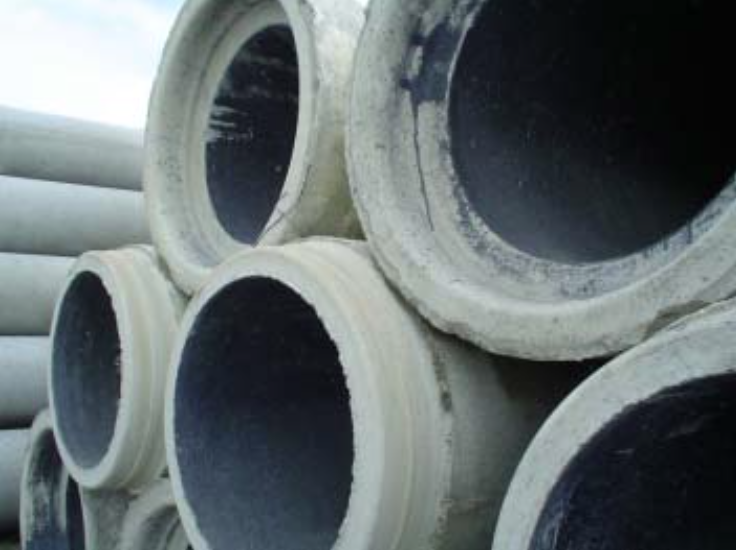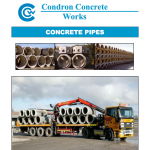Sulphate resistant/bitumen coated pipes
SULPHATE RESISTANT (S.R.) PIPES
In the rare conditions where sulphuric acid is present in the groundwater or where internal acid attack is thought likely, Sulphate Resistant concrete pipes should be used. These are made to order and to comply with sulphate class 4b of I.S. 6: 2004 Table 2 and give a high-class resistance to attack. High Sulphate Resistant Hydraulic Cement is used in concrete exposed to severe sulphate action, principally where soils or groundwaters have high sulphate content. It gains strength more slowly than General Use hydraulic cement. Use of a low water-to-cementing-materials ratio and low permeability are critical to the performance of any concrete exposed to severe sulphate attacks. Like other Portland cements, it is not resistant to acids and other highly corrosive substances
Ground Granulated Blast furnace Slag (GGBS) is added to concrete by addition at the concrete mixer, along with ordinary cement, aggregates and water. The normal ratios and proportions of aggregates and water to cementitious material in the mix remain unchanged. Mixing times are the same as for ordinary cement. Both wet mixing and dry mixing processes can be used for making concrete with GGBS.
GGBS is used as a direct replacement for ordinary cement, and replaces ordinary cement on a one-to-one basis by weight. Replacement rates for GGBS vary from 30% to up to 85%. Typically 50% is used in most instances. Higher replacement rates up to 85% are used in specialist applications such as in aggressive environments and to reduce heat of hydration.
| Sulphate Class | Cement Group | Minimum Cementitious Content (kg/m³) | |
| 2 | 1 | Reinforced Units | Unreinforced Units |
| 360 | 330 | ||
| 2 | 360 | 300 | |
| 3 | 360 | 300 | |
| 3 | 1 | 380 | 380 |
| 2 | 360 | 340 | |
| 3 | 360 | 320 | |
| 4a | 2 | 360 | 360 |
| 3 | 360 | 360 | |
| 4b | 2 | 360 | 360 |
| 3 | 360 | 360 | |
| 5 | Seek the Advice from the Manufacturer | Seek the Advice from the Manufacturer | Seek the Advice from the Manufacturer |
Extract from Table 2 Cementitious Content I.S. 6:2004
| Cement Group | Factory Produced or Combination (FP or COM) | Composition/ Specification |
| 1 | FP | Portland cement conforming to CEM 1 as specified in I.S. EN 197-1 |
| FP | Portland pfa cement conforming to CEM II/B-V as specified in I.S. EN 197-1 | |
| COM | Combination of Portland cement conforming to CEM 1 as specified in I.S. EN 197-1 and ggbs conforming to BS 6600 containing no less than 36% and not more than 65% ggbs by mass of ggbs plus cement | |
| 1 | COM | Combination of Portland cement conforming to CEM 1 as specified in I.S. EN 197-1 and pfa conforming to BS 3892-1 containing no less than 21% and not more than 35% pfa by mass of pfa plus cement |
| 2 | FP | Portland pfa cement conforming to CEM II/B-V as specified in I.S. EN 197-1 containing not less than 26% PFA by mass of nucleus |
| COM | Combination of Portland cement conforming to CEM 1 as specified in I.S. EN 197-1 and ggbs conforming to BS 6699 containing no less than 70% and not more than 85% ggbs by mass of ggbs plus cement | |
| 2 | Combination of Portland cement conforming to CEM 1 as specified in I.S. EN 197-1 and pfa conforming to BS 3892-1 containing no less than 25% and not more than 40% pfa by mass of nucleus | |
| 3 | FP | Sulphate resisting Portland cement conforming to BS 4027 |



